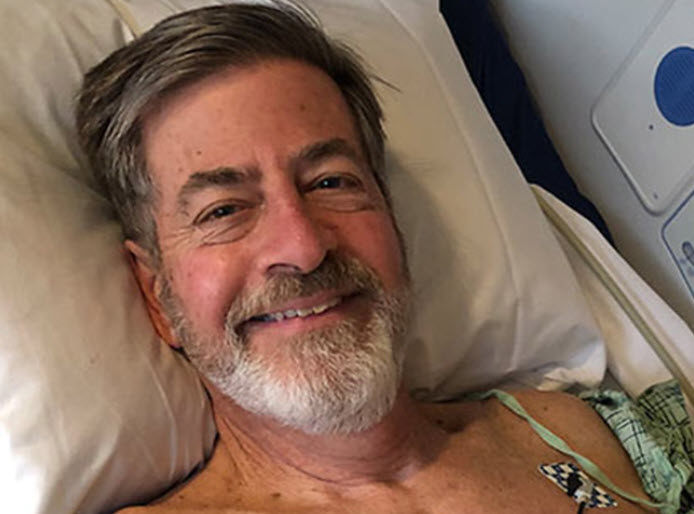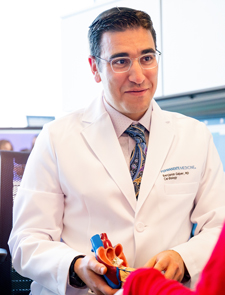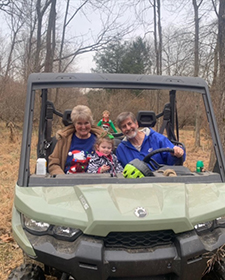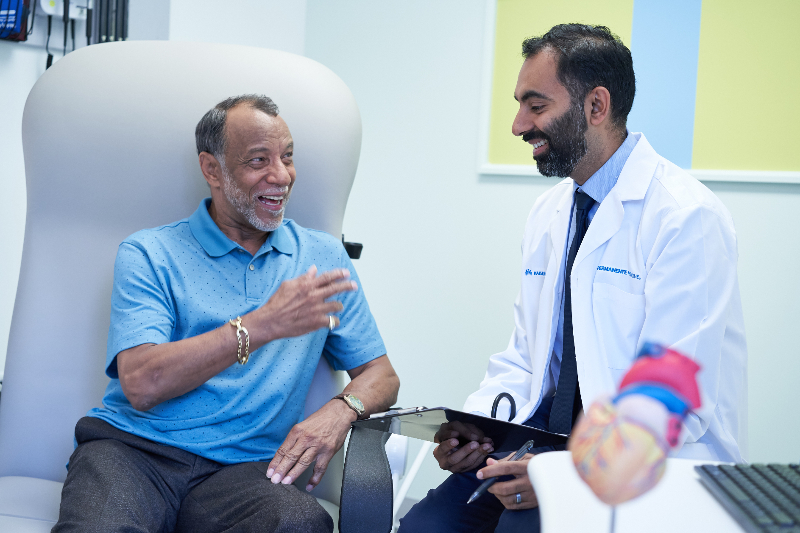Powered by Permanente Medicine, all Kaiser Permanente health plans rated among the nation's best in the 2024 National Committee for Quality Assurance ratings.

Patients return home one day after heart surgery
Kaiser Permanente provides a ‘concierge-level experience’ for aortic valve replacement
Ed Dalmasso, 70, is an engineer who enjoys working in his backyard and tinkering on projects around the house. In November 2021, he noticed he was starting to feel tired and winded more quickly than usual.
Dalmasso has a history of heart disease. He had a heart attack at 51, followed by 2 open-heart bypass surgeries. He recovered well from both of those procedures and continued to lead an active, healthy life, so he didn’t think his current symptoms had anything to do with his heart.
“I thought I was just starting to feel my age a bit,” he says. “But I went in to see my doctor to get checked out.”
His doctor detected a heart murmur and ordered an echocardiogram, an ultrasound that shows how the heart’s muscles and valves are working. The imaging revealed that his aortic valve, which connects the heart to its main artery, had narrowed. The condition, known as aortic stenosis, reduces blood flow to the rest of the body. In severe cases like Dalmasso’s, the recommended treatment is valve replacement.
Helping patients avoid open-heart surgery

Since Dalmasso is an older patient and had already had 2 open-heart surgeries, his interventional cardiologist, Benjamin Galper, MD, MPH, told him that he was a good candidate for a treatment called TAVR, short for transcatheter aortic valve replacement. TAVR involves threading a catheter (a tube with a small opening) through the patient’s leg into the heart, which allows the surgeon to replace the diseased aortic valve with a new, artificial one without opening the chest cavity.
TAVR provides a number of benefits over open-heart procedures: It is far less invasive, leaves smaller scars, and poses a lower risk of infection. Recovery is much faster, as well, since patients who have open-heart surgery often stay in the hospital for a week or more, while patients who have TAVR are usually home again after just a day or 2.
A ‘concierge-level experience’ for patients
TAVR was approved by the U.S. Food and Drug Administration in 2011, and Dr. Galper and his colleagues at the Mid-Atlantic Kaiser Permanente Cardiovascular Institute recently performed their 500th TAVR procedure. Cardiologists throughout Kaiser Permanente have continued to streamline the experience for patients before, during, and after the procedure.
“As a fully integrated system, we’re able to provide a concierge-level experience for our patients without the extra cost that’s typically associated with concierge medicine,” says Scott Haugen, MD, interventional cardiologist with Washington Permanente Medical Group and chief of Cardiology at Kaiser Permanente in Washington state. “Patients meet with our interventional cardiologist and cardiac surgeon and get all their necessary imaging done on the same day. That would require at least 3 or 4 separate visits in many settings outside of Kaiser Permanente.”
“The entire TAVR process is expedited so that the time from referral to the implant procedure is a month or less,” Dr. Galper explains. “Our patients usually stay in the hospital just one night, so they can recover at home with their families.”
‘I feel like myself again’

Dalmasso says every part of his cardiac care experience went smoothly.
“They did my TAVR procedure and then released me from the hospital the next day, which seemed like a miracle,” he says.
Dalmasso didn’t feel any pain after his treatment and was able to walk the very next day. Just 2 weeks after his heart murmur was detected, he was back to his normal life. He goes on long walks almost every day, exploring the hilly, forested land behind his home. And he’s back to working in his yard and on home projects.
“I feel like myself again,” he says.
This story is reprinted from the AboutKP website.


